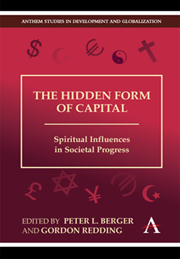Book contents
- Frontmatter
- Contents
- Contributors
- Preface
- Chapter 1 Introduction: Spiritual, Social, Human, and Financial Capital
- Chapter 2 Do Some Religions Do Better than Others?
- Chapter 3 Spiritual Capital and Economic Development: An Overview
- Chapter 4 The Possibilities and Limitations of Spiritual Capital in Chinese Societies
- Chapter 5 How Evangelicanism – Including Pentecostalism – Helps the Poor: The Role of Spiritual Capital
- Chapter 6 Flying under South Africa's Radar: The Growth and Impact of Pentecostals in a Developing Country
- Chapter 7 Importing Spiritual Capital: East-West Encounters and Capitalist Cultures in Eastern Europe After 1989
- Chapter 8 Orthodox Spiritual Capital and Russian Reform
- Chapter 9 Islam and Spiritual Capital: An Indonesian Case Study
- Chapter 10 Separating Religious Content from Religious Practice: Loose and Tight Institutions and their Relevance in Economic Evolution
Preface
Published online by Cambridge University Press: 05 March 2012
- Frontmatter
- Contents
- Contributors
- Preface
- Chapter 1 Introduction: Spiritual, Social, Human, and Financial Capital
- Chapter 2 Do Some Religions Do Better than Others?
- Chapter 3 Spiritual Capital and Economic Development: An Overview
- Chapter 4 The Possibilities and Limitations of Spiritual Capital in Chinese Societies
- Chapter 5 How Evangelicanism – Including Pentecostalism – Helps the Poor: The Role of Spiritual Capital
- Chapter 6 Flying under South Africa's Radar: The Growth and Impact of Pentecostals in a Developing Country
- Chapter 7 Importing Spiritual Capital: East-West Encounters and Capitalist Cultures in Eastern Europe After 1989
- Chapter 8 Orthodox Spiritual Capital and Russian Reform
- Chapter 9 Islam and Spiritual Capital: An Indonesian Case Study
- Chapter 10 Separating Religious Content from Religious Practice: Loose and Tight Institutions and their Relevance in Economic Evolution
Summary
The idea that societies have economic cultures as well as aesthetic, literary, and artistic cultures is well-embedded in a number of major studies attempting to identify the origins of national wealth and progress. From Adam Smith' s recognition of the role of moral sentiments, to the recent acknowledgement by Nobel prize-winning economic historian Douglass North that culture plays a key role in economic progress, there has always been awareness that it needed to be understood more completely. That it still is not speaks more to its complexity as a question than to the efforts devoted to its understanding.
Explanation in this field has to meet the challenge of the great number of factors in the equation, and the parallel challenge that many disciplines find culture hard to handle – too fuzzy, not visible or measurable enough, a residual perhaps after all the other more tangible things have been counted. Our aim here is to place it more centrally, not by further theoretical speculation, but by presenting evidence from several parts of the changing world about how the realm of the spirit affects the economy. The evidence comes from recent studies in Europe, Asia, Africa, Russia, and the US. The book is not entirely without theory, but its main intent is the presentation of new findings from the fields.
The initiative for this collection of work began with a collaboration between the Metanexus Institute, Pennsylvania, and the Institute on Culture, Religion and World Affairs of Boston University.
- Type
- Chapter
- Information
- The Hidden Form of CapitalSpiritual Influences in Societal Progress, pp. xi - xiiPublisher: Anthem PressPrint publication year: 2010



